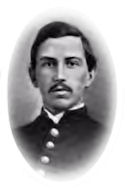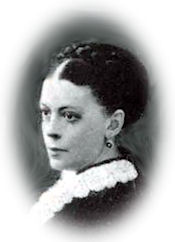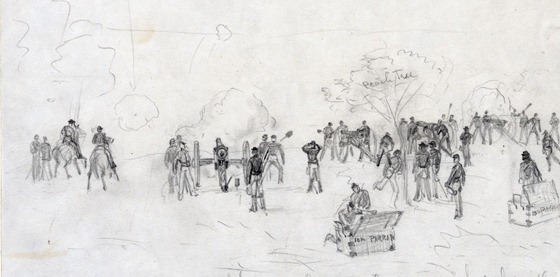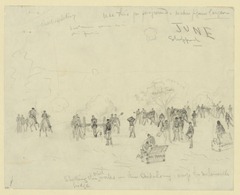June 26th.
Yesterday morning, just as I stepped out of bed I heard the report of four cannon fired in rapid succession, and everybody asked everybody else, “ Did you hear that?” so significantly, that I must say my heart beat very rapidly for a few moments, at the thought of another stampede. At half-past six this morning I was wakened by another report, followed by seven others, and heard again the question, “Did you hear that?” on a higher key than yesterday. — It did not take me many minutes to get out of bed, and to slip on a few articles, I confess. My chief desire was to wash my face before running, if they were actually shelling us again. It appears that they were only practicing, however, and no harm was intended. But we are living on such a volcano, that, not knowing what to expect, we are rather nervous.
I am afraid this close confinement will prove too much for me; my long walks are cut off, on account of the soldiers. One month to-morrow since my last visit to the graveyard! That haunts me always; it must be so dreary out there! Here is a sketch of my daily life, enough to finish me off forever, if much longer persisted in.
First, get up a little before seven. After breakfast, which is generally within a few minutes after I get down (it used to be just as I got ready, and sometimes before, last winter), I attend to my garden, which consists of two strips of ground the length of the house, in front, where I can find an hour’s work in examining and admiring my flowers, replanting those that the cows and horses occasionally (once a day) pull up for me, and in turning the soil over and over again to see which side grows best. O my garden! abode of rare delights! how many pleasant hours I have passed in you, armed with scissors, knife, hoe, or rake, only pausing when Mr. This or Mr. That leaned over the fence to have a talk! — last spring, that was; ever so many are dead now, for all I know, and all off at the war. Now I work for the edification of proper young women, who look in astonishment at me, as they would consider themselves degraded by the pursuit. A delicate pair of hands my flower mania will leave me!
Then I hear Dellie’s and Morgan’s lessons, after which I open my desk and am lost in the mysteries of Arithmetic, Geography, Blair’s Lectures, Noël et Chapsal, Ollendorff, and reading aloud in French and English, besides writing occasionally in each, and sometimes a peep at Lavoisne, until very nearly dinner. The day is not half long enough for me. Many things I would like to study I am forced to give up, for want of leisure to devote to them. But one of these days, I will make up for present deficiencies. I study only what I absolutely love, now; but then, if I can, I will study what I am at present ignorant of, and cultivate a taste for something new. The few moments before dinner, and all the time after, I devote to writing, sewing, knitting, etc., and if I included darning, repairs, alterations, etc., my list would be tremendous, for I get through with a great deal of sewing. Somewhere in the day, I find half an hour, or more, to spend at the piano. Before sunset I dress, and am free to spend the evening at home, or else walk to Mrs. Brunot’s, for it is not safe to go farther than those three squares, away from home. From early twilight until supper, Miriam and I sing with the guitar, generally, and after, sit comfortably under the chandelier and read until about ten. What little reading I do, is almost exclusively done at that time. It sounds woefully little, but my list of books grows to quite a respectable size, in the course of a year.
At ten comes my Bible class for the servants. Lucy, Rose, Nancy, and Dophy assemble in my room, and hear me read the Bible, or stories from the Bible for a while. Then one by one say their prayers — they cannot be persuaded to say them together; Dophy says “she can’t say with Rose, ’cause she ain’t got no brothers and sisters to pray for,” and Lucy has no father or mother, and so they go. All difficulties and grievances during the day are laid before me, and I sit like Moses judging the children of Israel, until I can appease the discord. Sometimes it is not so easy. For instance, that memorable night when I had to work Rose’s stubborn heart to a proper pitch of repentance for having stabbed a carving-fork in Lucy’s arm in a fit of temper. I don’t know that I was ever as much astonished as I was at seeing the dogged, sullen girl throw herself on the floor in a burst of tears, and say if God would forgive her she would never do it again. I was lashing myself internally for not being able to speak as I should, furious at myself for talking so weakly, and lo! here the girl tumbles over wailing and weeping! And Dophy, overcome by her feelings, sobs, “Lucy, I scratched you last week! please forgive me this once!” And amazed and bewildered I look at the touching tableau before me of kissing and reconciliation, for Lucy can bear malice toward no one, and is ready to forgive before others repent, and I look from one to the other, wondering what it was that upset them so completely, for certainly no words of mine caused it. Sometimes Lucy sings a wild hymn, “Did you ever hear the heaven bells ring?” “Come, my loving brothers,” “ When I put on my starry crown,” etc.; and after some such scene as that just described, it is pleasant to hear them going out of the room saying, “Good-night, Miss Sarah!” “God bless Miss Sarah!” and all that.












